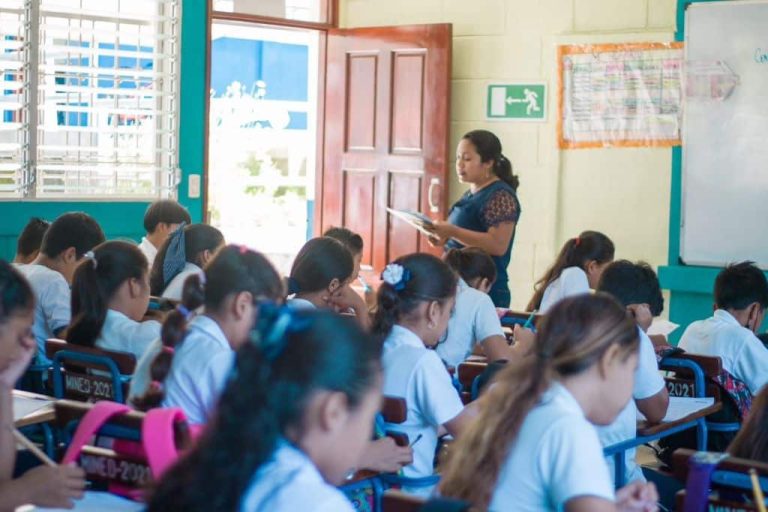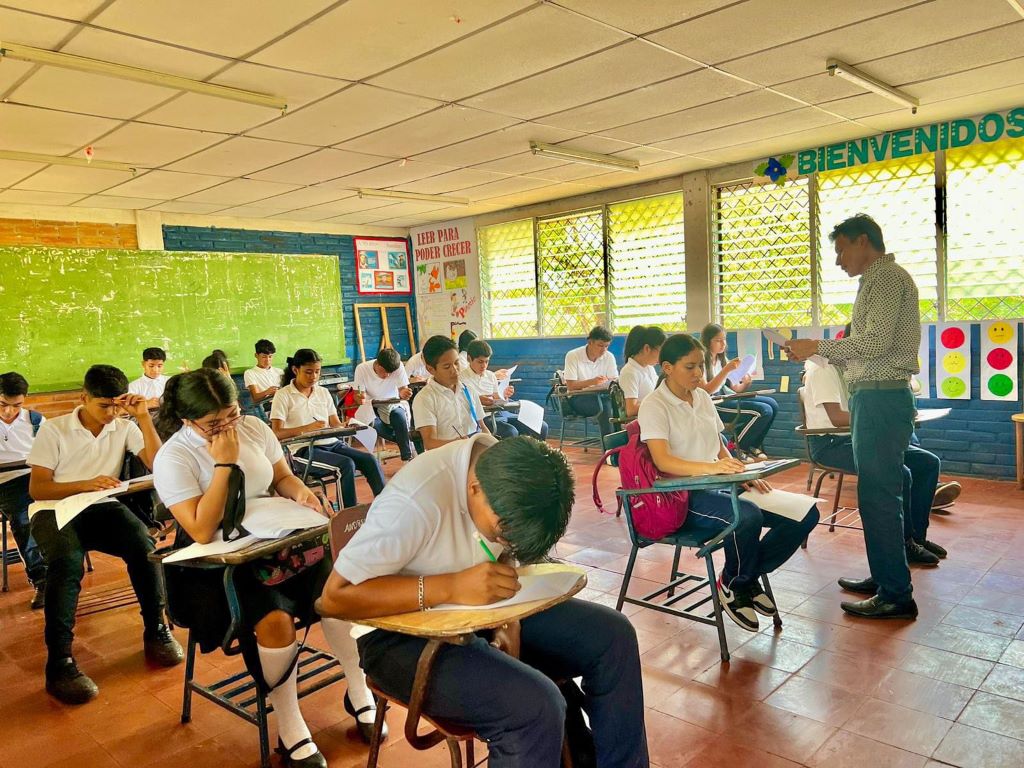8 de julio 2024

Children of Exile: The Births “Sowing Hope” in the Camp of Nicaraguan Farmers

PUBLICIDAD 1M
PUBLICIDAD 4D
PUBLICIDAD 5D
Public education lost 2,931 teachers between 2019 and May 2024, according to official data. Teachers denounce abuses and indoctrination by the regime.

A teacher conducts a class at a public primary school in Managua. Photo: Taken from Mined
Irma had been teaching at a school in Masaya for five years when she decided to resign. She confesses that the decision was difficult because she “loved” sharing every day with her students. But the low salary and extreme surveillance by the dictatorship of Daniel Ortega and Rosario Murillo convinced her. “I had to leave the classrooms, just like many other teachers,” she says.
After she resigned, “many others followed,” and she explains that now “most of the teachers at the school are young, starting to work for the first time.” Irma says it took almost six months for her to get her severance pay. “When you resign, they have no way to keep you because they can’t make a better offer,” she confesses.
Her severance pay was about 35,000 córdobas (just under $1,000 USD). “It’s little because teachers continue to have low salaries, but at least I was lucky to leave before the new calculations they imposed, because they would have given me much less,” she notes.
Now she works in a customer service company. “It wasn’t the dream of my life, but they pay me better and I don’t have the pressure of feeling obliged to indoctrinate students or participate in partisan acts,” she affirms.
Irma states that, nationwide, “there are teacher resignations every day,” and she believes most leave because they are unwilling to teach under political subjugation. Many prefer to start businesses, engage in other jobs, or leave the country.
Nicaragua has lost 2,931 teachers between 2019 and May 2024, according to employment distribution figures by occupational category in the central government, recently published by the Central Bank of Nicaragua.
According to this report, the public education system had 50,026 teachers as of May 2024, 395 fewer than in December 2023 when the country ended with 50,421 teachers nationwide.
2019 was the last year with growth in hired teachers, with a total of 52,957 for the entire public education system. Meanwhile, 2023 saw the biggest drop in the number of teachers: 1,047 fewer.
On June 21, 2024, the vice president and only regime spokesperson, Rosario Murillo, assured that 54,744 teachers would receive a bonus for Teacher’s Day. Murillo’s figure does not match those published by the Central Bank and the Ministry of Finance and Public Credit as of May 2024. Nor does it correspond with the average monthly hiring over the past 17 months.
Shortly after the start of the 2018 citizen protests, on the last Fridays of each month, teachers began receiving “motivational” talks that “promote peace and reconciliation” to reject “coups,” revealed an investigation by CONFIDENCIAL published in August 2019.
Educators have also denounced that the books distributed by the Ministry of Education include content related to the personality cult of Ortega and Murillo. Additionally, the red and black Sandinista flag has been imposed in schools and educational events throughout the country.
“They want to treat you as if you were a party subject, and many of us have been in teaching long before they returned to power (in 2007),” comments Mariela, a high school teacher in Carazo.
She admits that she constantly received orders to “indoctrinate students with political propaganda and even monitor the behavior of their students or their families.”
“I resigned because I was fed up with so much pressure and the manipulation of public education, which prioritizes having students glorify the dictatorship over caring about quality,” she maintains.
Mariela assures that they are forced “not to fail students because they want to have perfect statistics, even though it’s all a farce.”
Moreover, she denounces that they have been instructed to receive training in handling weapons. “They want public workers to be soldiers at any sign of protest,” she laments.
Bayardo, a primary school teacher in Granada, points out that the regime continues trying to “convince us to talk about how good the government of Ortega and Murillo is.”
“Behind all the espionage and surveillance to which we are subjected, it is evident that they do not trust us and are afraid that we will rebel. Many teachers have also been fired, which in turn causes people to resign due to the terror they have imposed,” he said.

Elvira Cuadra, director of the Central American Transdisciplinary Studies Center, indicates that the teaching field in Nicaragua “has been one of the most punished” and “least appreciated” in terms of budget and public policies for the country’s development.
“Teachers continue to work in difficult conditions, with poor salaries, and besides all that, which is historical, it has worsened with the imposition of a control system in which they have no freedom to teach,” she laments.
Cuadra assesses that with “the exodus of teachers who seek work in the informal sector or emigrate to find better opportunities (…) what ends up being sacrificed is the quality of education.”
“A public education system that forces teachers to pass students to maintain the false statistics that everything is working will only result is that these young people will not be professionally prepared later,” warns the researcher.
In 2023, Mined projected enrolling 1,543,351 students in preschool, primary, secondary, and special schools. However, according to the 2023 General Budget Report, the enrollment was 1,574,915 students in all modalities, exceeding the target by 31,564 students.
In January 2024, Murillo announced through propaganda media that the enrollment was 1,803,692 students at the start of the school year.
“There are fewer teachers, but there are more students in the classrooms, and all of that affects the quality of learning because it’s different dedicating time to 45 students than to 55 or 65,” emphasizes Professor Bayardo.
This teacher says it is difficult to provide “quality time to each student.”
Ernesto, a primary school teacher in Managua, said teachers have suffered “many abuses” in recent years. The arbitrariness ranges from overloading them with students to forcing them to include partisan activities in their classes.
“They force us to participate in marches, partisan acts, they also include regime propaganda in the books, and when we don’t comply, they give us warnings,” he assures.
In June 2024, members of a teacher’s union denounced to the newspaper La Prensa that teachers were threatened with dismissal if they did not include a series of activities related to exalting the image of Commander Carlos Fonseca Amador, in commemoration of the 88th anniversary of his birth, in their work plans.
“They use us to promote partisan activities, and students are manipulated to join in exchange for gaining points or losing class hours in events that do not help their personal development,” denounces Ernesto.
This article was published in Spanish in Confidencial and translated by Havana Times. To get the most relevant news from our English coverage delivered straight to your inbox, subscribe to The Dispatch.
PUBLICIDAD 3M
Confidencial es un diario digital nicaragüense, de formato multimedia, fundado por Carlos F. Chamorro en junio de 1996. Inició como un semanario impreso y hoy es un medio de referencia regional con información, análisis, entrevistas, perfiles, reportajes e investigaciones sobre Nicaragua, informando desde el exilio por la persecución política de la dictadura de Daniel Ortega y Rosario Murillo.
PUBLICIDAD 3D